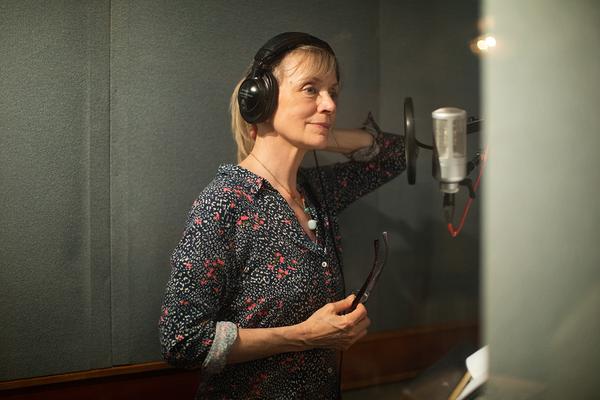Jazz Recording Review: “If There Are Mountains” — An Instant Classic
By Michael Ullman
There’s much to admire in If There Are Mountains, modulated pathos as well as subtle joys.
Dave Douglas and Elan Mehler with Dominique Eade: If There are Mountains (Newvelle Records)

Pianist Elan Mehler (left) and trumpeter Dave Douglas. Photo: Newvelle Records.
Newvelle Records is in the middle of its fifth season of beautifully engineered and realistically recorded high end LPs, records so initially silent that when I put one on, I instinctively check to see if I have turned my amplifier on. Featuring Boston’s own Dominique Eade on vocals, If There Are Mountains is — to my ears — an instant classic, its melodies and words haunting and expressive…and sometimes, as on trumpeter Dave Douglas’s composition “If There Are Mountains,” swinging.
The title piece begins with a stirring bass line by Simón Willson over a a bit of a backbeat by drummer Dayeon Seok and some murmuring sounds by Douglas, who then states his simple, repetitive, and distinctly memorable main theme. Then Eade enters singing a haiku by Japanese poet Santoka Taneda. The vocalist is both warm and sophisticated: “If there are mountains, I look at the mountains. On rainy days, I listen to the rain.” To that point the piece has been gently insistent. But then the poem takes a turn, and, in a sweetly soaring moment, Eade sings the B section of the composition. It’s like watching a bird take off: “Spring, summer, autumn, winter/ Tomorrow too will be good,/ Tonight, too is good.” It’s as if the poet had to work his way back to the present. One of the most celebrated contemporary musicians, comfortable in any genre, Douglas then solos cogently before Eade returns. (He and pianist Elan Mehler composed the music for these songs.) Eade is a wonder: manipulating her voice in unaffected ways, holding back here and then stretching something else out there or adding a bit of hoarseness or vibrato in a manner that comes off as natural and unassuming.
None of the melodies on this session is particularly easy to sing. Nor, evidently, was the project easy to get off the ground. As pianist-producer Mehler tells the story, Douglas had already set some haiku to his melodies. And the had two covered one of them, “Village of No Bells,” in a live performance: “I loved the way Dave told an almost parallel story to these short lines from 17th-century poet Bashō, amplifying the message but also turning it on its head.” The lyrics couldn’t be simpler: “Village of no bells/ Spring evenings/ What’s to listen for?” This is the seventh number on If There Are Mountains: it begins with a gently probing introduction, a quietly stated duet between Douglas and clarinetist John Gunther. Mehler enters with a decisive set of chords. Then arrives a surprise: Eade enters with the melody way up high. (It seems hardly fair to her.) As she finishes her first run-through of the lyrics, the music comes to a temporary stop, as if inviting us to wait for what might be coming.

Singer Dominique Eade — she is a wonder. Photo: Newvelle Records.
With Douglas’s piece as a model, Mehler set off to explore the world of haiku, infinitely restrained poems whose minimalism is perfectly suited to suggest the nuances of absence and loss, as well as to command fastidious attention to the present. Mehler describes his journey: “Despite my lack of knowledge of Japanese poetry, I started reading haiku and searching for a ‘click’ that would inspire some compositional idea for me. It was rough going.… Haiku, to my uneducated ears, were often quotidian and startlingly matter of fact.… I spent weeks reading through collections, feeling completely lost. Then, I found my spark.” It was Yosa Buson’s haiku that begins “May rains,” which Mehler heard as a rising fifth: this instant translation from lyrical to musical phrase was what the composer needed. (Eade sounds celebratory when she sings these two syllables; it is as if she shared the composer’s relief.) He was off.
There’s musical variety to the linguistic spareness: all members of the band improvise boldly on “The Spring Current,” whose text depicts a girl wading through a stream, her feet muddied. This one stops abruptly. The most touching track is “We Saw You Off.” Here are the lyrics: “We saw you off/ And returning through the fields/ I thought, morning dew had wet my sleeves/ But it was tears.” The speaker seems sorrowful but almost disembodied; observing carefully, but from the outside of his or her own grief. Eade renders the last word, which is also the last note of the performance, with a sudden drop. The final poem seems to circle around its subject, beginning with an emotional reaction and ending precisely with its source: “With your singing you made me lonelier than ever/ You solitary bird/ Cuckoo of the forest.” The melody begins with a downward phrase sung by Eade. The second time through, the melody changes, and her voice becomes somehow richer.
There’s much to admire in If There Are Mountains, modulated pathos as well as subtle joys. The compositions are memorable, the solos beautifully attuned to the subjects, the rhythm section lively as well as supportive. It seems appropriate to end with a haiku about Mount Fuji by the master, Bashō:
with clouds and mist
in a brief moment a hundred scenes
brought to fulfillment
Michael Ullman studied classical clarinet and was educated at Harvard, the University of Chicago, and the U. of Michigan, from which he received a PhD in English. The author or co-author of two books on jazz, he has written on jazz and classical music for the Atlantic Monthly, New Republic, High Fidelity, Stereophile, Boston Phoenix, Boston Globe, and other venues. His articles on Dickens, Joyce, Kipling, and others have appeared in academic journals. For over 20 years, he has written a bi-monthly jazz column for Fanfare Magazine, for which he also reviews classical music. At Tufts University, he teaches mostly modernist writers in the English Department and jazz and blues history in the Music Department. He plays piano badly.

